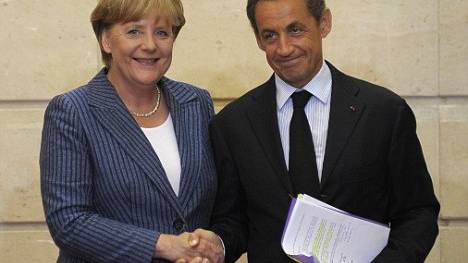France and Germany call for "True Economic Government" - Rise of the Fourth Reich?
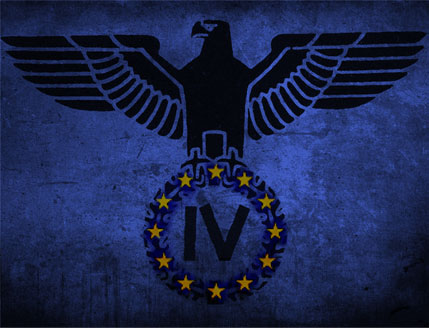
Rise of the Fourth Reich, how Germany is using the financial crisis to conquer Europe
By Simon Heffer | DailyMail.co.uk
Yesterday’s crisis meeting between Angela Merkel and Nicolas Sarkozy was arranged before the participants knew of the disastrous growth figures in the Eurozone that emerged in the morning.
The background to the meeting was last week’s tumult in the world financial markets. Shares had gone into freefall after the downgrading of America’s credit rating.
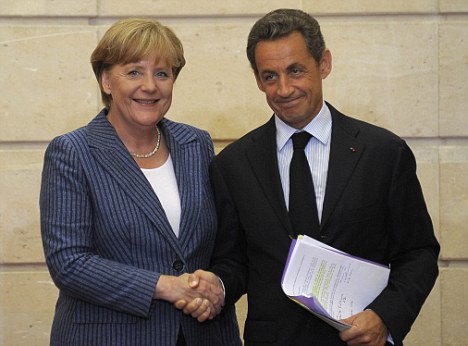
Angela Merkel and Nicolas Sarkozy met to discuss the crisis yesterday, with the outcome of conversations suggesting a fiscal union could be created - of which Germany will dictate terms
Worse than that, however, were the tremors rattling some of Europe’s most important banks, notably in France, caused by further evidence of the utter failure of even the more developed European economies to live anything like within their means.
Chancellor Merkel has managed to use the hard-earned money of German taxpayers to bail out profligate Eurozone countries without suffering any political fall-out. This is unlikely to remain the case and Mrs Merkel knows it.
That is why yesterday she played down talk of the European Central Bank — funded by German-backed Eurobonds — paying off the debts of these all-but-bankrupt nations.
Instead, there was forceful talk of Eurozone countries being coerced into balancing their budgets and reducing their debt through what Merkel and Sarkozy called a ‘true European economic government movement’ made up of all the heads of state and led, initially, by the EU President Herman Van Rompuy.
Frau Merkel called for a ‘stronger coordination of policy’ and ‘a new quality of cooperation’ within the Eurozone.
Although she will not yet admit it, this all suggests the first step has been taken towards a fiscal union that will leave Germany dictating the financial terms for the rest of Europe.
It is the one country that is able to do so. Greece, Ireland and Portugal are economic basket cases. We have heard more and more about the trouble in Spain, where unemployment is over 20 per cent.
Italy is tottering — the figures for 2010 show it has debts of 116 per cent of GDP, making the country second only to Greece at around 143 per cent.
Meanwhile, the recent addition of France to the list of at-risk economies has caused real shock and panic across the Channel. Its banks hold about an eighth of Greek debt, or $57 billion, its stock market has tumbled and credit rating agencies are talking of removing France’s triple A status.
So, after a summer of increasingly shrill panics around the Mediterranean, the contagion is moving north. Individual bail-outs have been tried, but they obstinately refuse to work. Only an idiot would think they would: they treat only the symptoms of Europe’s economic decline, not its causes.
If only everybody could be like the Germans, and spend just a mite more than they earn, then all would be well, the markets seem to say.
Germany lay in ruins in 1945, but it then invested in manufacturing plant, developed first-class education, innovated, raised its productivity and competed on quality not price.
Over the next 60 years it won the peace as comprehensively as it lost the war.
If the euro is to survive — and with it the European project — the other 16 Eurozone countries will have to be like the Germans. Indeed, they must lose the freedom not to be like the Germans.
Be in no doubt what fiscal union means: it is one economic policy, one taxation system, one social security system, one debt, one economy, one finance minister. And all of the above would be German.
That means a complete fiscal union in which Germany, as the EU’s most powerful economy and principal paymaster, makes the rules and makes them unbreakable.
Read the full article at: dailymail.co.uk
Sarkozy and Merkel call for ’true economic government’ to save eurozone
By Polly Curtis | Guardian.co.uk
France and Germany have set out plans to create the first "true European economic government" headed by a single appointed leader, as part of major moves to synchronise tax and spending to save the failing eurozone.
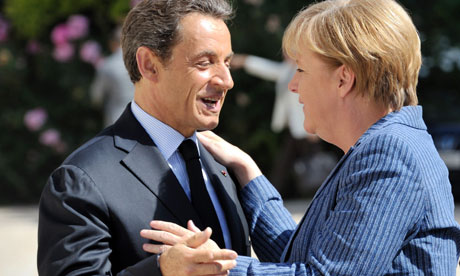
The French president, Nicolas Sarkozy, and German chancellor, Angela Merkel, announced the dramatic proposals after a two-hour mini-summit. They also called for the imposition of tighter restrictions on member country’s deficits and announced a synchronising of the tax policies of their own two countries. Sarkozy has also secured the support of Merkel for a Tobin tax – a financial tax on all international transactions – to raise funds to ease the crisis engulfing the European economy.
The establishment of an economic government for the eurozone will be regarded by eurosceptics as a political power grab for Europe.
On Tuesday night, the British government gave a cautious welcome to the move, saying they would adopt a "watch and see" policy. A treasury source said: "This looks like the right direction but we need to see how it pans out. We will continue to advance UK interests at every opportunity." The government has no formal position on the Tobin tax, but has stressed that any such tax would need to be truly international to be successful and not disadvantage participating countries.
The proposals, on the day of dire growth figures for Germany, normally considered one of Europe’s safest economies disappointed the markets.
Sarkozy said the most important element was the plan "to create a real economic government for the eurozone".
Merkel said "there has to be a stronger coordination of financial and economic policy" to protect the euro, adding: "We will regain the lost confidence. That is why we go into a phase with a new quality of cooperation within the eurozone."
The European Council president, Herman van Rompuy, will be asked to head the new economic government, and will set and enforce a deadline for all 17 eurozone members to reduce their deficits, putting pressure on countries such as Greece and Portugal to shore up public spending.
Merkel said they had rejected for now the idea of euro bonds, which would have pooled the members states’ governments’ debts to reduce the overall risk of the eurozone,but neither leader ruled their use out in the future.
Read the full article at: guardian.co.uk
"Global markets have taken a nose dive, after the leaders of the EU’s strongest economies failed to calm fears of a deepening crisis. Angela Merkel and Nickola Sarkozy called for the creation of a central economic body which would ensure Eurozone members take more financial responsibility. But they brushed aside suggestions of expanding the EU bailout fund, or releasing Eurobonds to help keep the single currency afloat. RT talks to political analyst and author F. William Engdahl."
Video from: YouTube.com
Video from: YouTube.com
Video from: YouTube.com
What Will a European Economic Government Entail?
By Stefan Kaiser | Spiegel.de
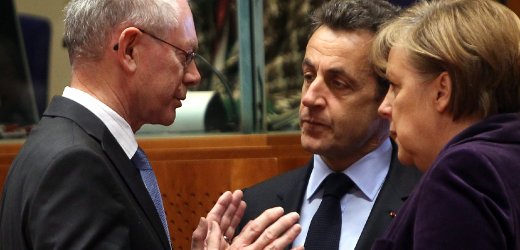
European Council President Herman Van Rompuy (left) is tipped to head the European economic government proposed on Tuesday by French President Nicolas Sarkozy (C) and German Chancellor Angela Merkel.
German Chancellor Angela Merkel and French President Nicolas Sarkozy want to create a European economic government. The idea sounds good, but it is unclear exactly what it means. If the proposal is serious, it will lead to significant changes -- especially for Germany.
The words sound mighty enough: A "true economic government" will be created to coordinate economic and finance policies in the euro zone in future to make the currency union more resistant to crises. That’s what German Chancellor Angela Merkel and French President Nicolas Sarkozy agreed to at their summit on Tuesday afternoon. But neither leader offered much more than that during their joint press conference, and they left completely open precisely what this economic government is meant to do.
That’s little wonder, either. After all, the term "economic government" can be interpreted in different ways. The French have been using it for years to describe government intervention in the economy through, for example, state holdings in important companies. But the German chancellor appears to have an altogether different understanding of the term. "The member states of the euro zone need to ensure, with a greater degree of commitment, that they adhere to the existing Stability and Growth Pact," Merkel said after her meeting with the French president.
In fact, Tuesday’s agreement does seem to largely take into account German concerns over stability. The proposal calls for the 17 euro-zone member states to anchor balanced-budget provisions into their constitutions, and to take account of European Commission concerns when setting their national budget plans. Of course, the idea isn’t entirely new. Already back in March, the euro-zone states agreed to the so-called "Euro Plus Pact," which would lead to closer coordination of budget, tax and social policies -- albeit non-binding.
Jean-Claude Juncker Would Be Stripped of Power
"Up until now, the term had been a pretty empty one," said Henrik Enderlein, professor of political economy at the Hertie School of Governance in Berlin. He said it was now a task for the euro-zone countries to fill the term with meaning. "What is needed is a change in mentality. The governments have to see that they can no longer create national economic policies, but rather only European ones in the future."
Enderlein said he could imagine a kind of European finance minister who would monitor and coordinate the policies of euro-zone states. "There has to be someone who tells the individual governments: What you are doing right now is damaging to the euro zone. Unfortunately, an institution like that doesn’t exist yet."
Until now, the Euro Group has been in charge of coordinating economic policy among the 17 euro nations and checking whether they are adhering to the Stability Pact. It consists of the finance ministers of the euro countries as well as representatives of the European Commission and the European Central Bank. Its chairman is the prime minister of Luxembourg, Jean-Claude Juncker.
According to the plans presented on Tuesday by Merkel and Sarkozy, the future economic government would comprise the 17 heads of government and would meet twice a year. It is set to be chaired by Herman Van Rompuy, the current president of the European Council. "The proposal for an economic government is an attempt to sideline Jean-Claude Juncker," says Enderlein. "That is a pretty open snub."
Read the full article at: spiegel.de
Counter: No, EU talk of economic governance does NOT herald the Fourth Reich
Top Nazis Planned EU-Style Fourth Reich
The Red House Report
